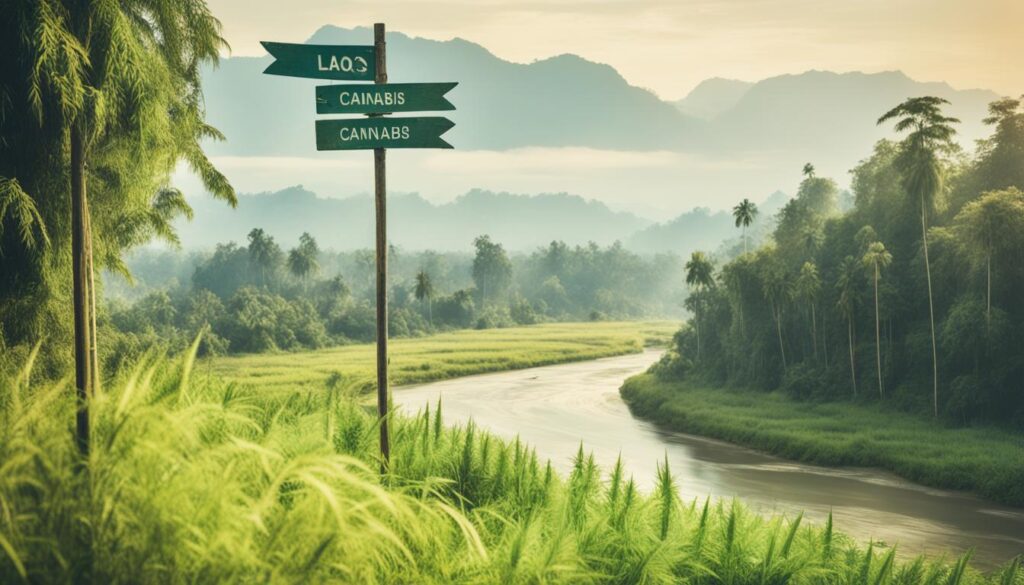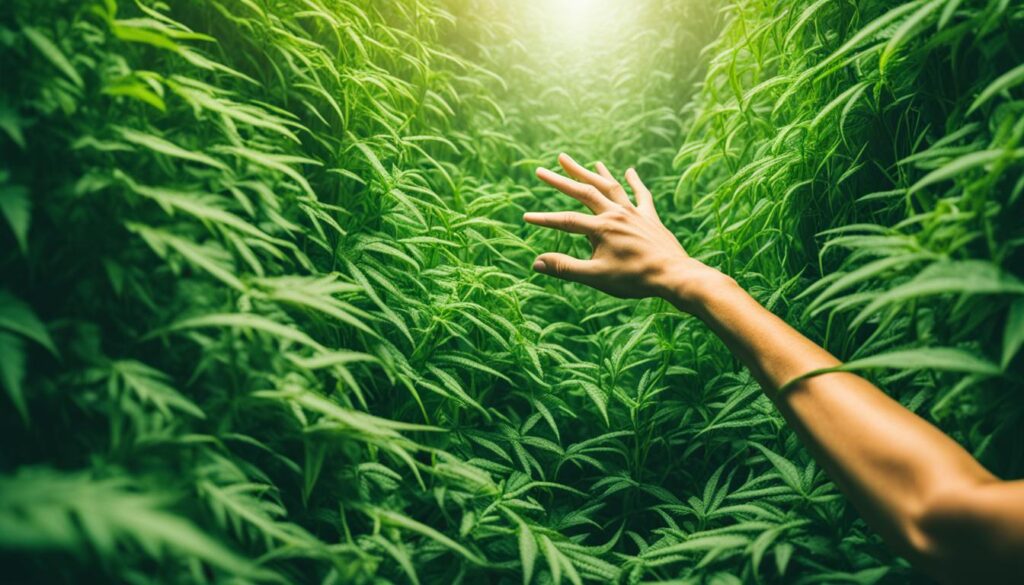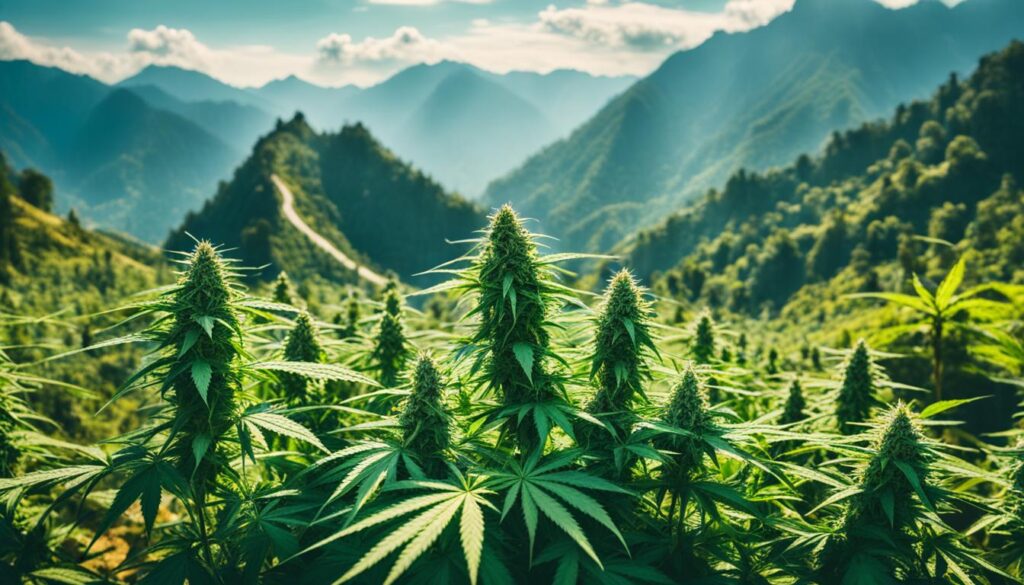Are you planning a trip to Laos? You might wonder about the rules on weed and cannabis. This guide will help you understand the laws, culture, and the growing weed industry in Laos. It will give you the info you need to enjoy your visit safely.
Laos is a beautiful country with a deep history of growing and using cannabis. The laws on weed are changing, with a committee looking into making it legal in 2019. But, the rules and punishments for having or using weed are still tough.
It’s important to know the laws and risks of using weed in Laos. This article will talk about cannabis in Laotian culture, new laws, and the gray areas you might find. It will help you make smart choices during your trip.
Key Takeaways
- Laos has a complex and evolving legal framework surrounding the cultivation, production, and use of weed and cannabis-related products.
- While the government has considered legalization, the current laws prohibit the production, trade, and use of all types of cannabis, with severe penalties for violations.
- Certain hemp-related activities and products are permitted under strict guidelines, but the overall landscape remains highly regulated.
- Travelers should exercise caution and respect local laws and customs when it comes to the use of weed and other controlled substances in Laos.
- The cultural and historical significance of cannabis in Laotian society provides a unique context to explore, blending tradition and emerging industry.
The Historical Significance of Cannabis in Laotian Culture
Cannabis has been a big part of Laotian culture for a long time. It has been used for medicine, ceremonies, and farming. Looking into cannabis in Laos shows us a rich history of traditions that have lasted for many years.
Cannabis in Traditional Medicine and Rituals
In Laos, people have always valued cannabis for its healing powers. It helps with many health issues. Traditional healers use it to make people feel better and keep the community healthy.
Cannabis is also key in spiritual rituals. It helps people feel closer to the divine and strengthens community bonds.
The Agricultural Significance of Cannabis
Cannabis has been crucial in Laotian farming for a long time. Rural folks grow it to make a living. It’s useful for many things, like making fibers or selling it.
This has made cannabis agriculture a big part of Laos’s culture and economy.
“Cannabis has been an integral part of Laotian heritage, used to treat common ailments, enhance spiritual practices, and sustain rural livelihoods.”
Cannabis is very important in Laotian culture. It’s used in medicine, rituals, and farming. This strong connection with the plant still affects how people see and use cannabis today.
weed in Laos: Navigating the Legal Landscape
The laws about weed in Laos are strict. They have tough rules and big penalties for possession and use. Even though there’s talk of legalization, the rules in Southeast Asia are still strict. It’s important to know the laws and keep up with changes if you’re into weed in Laos.
Understanding the Legal Framework
The Law on Narcotics in Laos says no to using, growing, or having weed, including marijuana. The Penal Code has harsh punishments for weed-related crimes. These can be three months to life in jail and fines from LAK 500,000 to 200 million (about USD 52 to 21,200).
Recent Changes and Developments in Legislation
In 2019, Laos set up a committee to look into making hemp cultivation legal for medicine. Some companies in Laos can now grow hemp in certain areas under special programs. But, the rules on cannabis are still very strict.
Other countries like Canada and the U.S. are making it easier on cannabis and CBD products. The EU Court of Justice might also lead to softer rules on CBD products in Europe. This could change things in Laos, but for now, weed is still illegal.

The Lao government is thinking about making hemp cultivation legal for medicine. They’ve let some companies grow hemp in certain places. But, the rules for having weed in Laos are still very strict. Any big changes will happen slowly and carefully.
Exploring Legal Loopholes and Gray Areas
In Laos, the rules on marijuana are strict, but there are still ways to get around them. This is because of deep cultural beliefs about the plant. There are rumors of corruption or special deals for cannabis offenses. This makes it hard to know what’s okay and what’s not.
Persistence of Traditional Uses and Cultural Norms
Laos has a long history of using cannabis for health, rituals, and farming. This has kept some old ways of using it alive, even with legal loopholes and strict laws. Some places, the police don’t bother enforcing the rules much. They know cannabis is important to Laotian culture.
| Laotian Weed Legality | Penalties for Possession | Corruption and Flexibility |
|---|---|---|
| Strict laws prohibiting the possession and use of cannabis | Possession can result in prison sentences of up to 5 years, while trafficking convictions carry penalties of up to life imprisonment | Rumors suggest some flexibility or bribes can help reduce or avoid punishment for minor cannabis offenses |
The cultural norms and traditions around cannabis in Laos make the laws complex. It’s not always clear what’s allowed and what’s not. To get by, you need to understand these rules well.

Cannabis Cultivation in Laos: From Tradition to Industry
Cannabis has been a big part of farming in Laos for a long time. Farmers used old ways to grow it. Now, they mix old and new methods, like organic farming and saving water, to grow cannabis in Laos. This mix is changing the cannabis sector in Laos for the better.
Organic Farming Practices and Sustainability
Laotian cannabis farmers use organic farming to make sure their crops are good and safe for the planet. They do this by:
- Using natural stuff to help plants grow and fight pests
- Saving water to protect the environment
- Keeping a close eye on quality to meet high standards
This helps with organic weed cultivation in Laos and shows the industry’s care for the planet.
Blending Tradition and Innovation
The Laotian cannabis industry is changing, and it’s important to mix old farming ways with new ideas. Farmers are finding ways to use old methods with new tech and better farming ways. This mix keeps the cultural heritage alive and moves the industry forward.
| Traditional Farming Practices | Modern Cultivation Techniques |
|---|---|
| Organic pest management | Precision irrigation systems |
| Crop rotation and diversification | Advanced greenhouse technology |
| Natural fertilizer application | Automated monitoring and control |
The future of cannabis farming in Laos looks bright. It will be a mix of old and new, making a strong and green industry.
“We are not just growing cannabis, but preserving the essence of our cultural heritage. Our approach blends the wisdom of the past with the technology of the future, creating a truly unique and sustainable industry.”
– A Laotian cannabis farmer
Weed Tourism in Laos: Emerging Hotspots and Local Economies
Laos is now a top spot for weed tourism. Places like Vang Vieng and Luang Prabang attract cannabis lovers. They offer beautiful views and unique experiences. But, it’s key to travel responsibly and respect the local culture and laws.
Popular Destinations for Cannabis Enthusiasts
Vang Vieng is a beautiful town by the Nam Song River. It’s known for its adventure and cannabis scene. About 170,000 people visit each year to enjoy the bars and riverside fun.
Luang Prabang is another spot for cannabis tourists. It’s a UNESCO World Heritage Site with a rich culture. Visitors come for the history and relaxed vibe.
Respecting Local Heritage and Laws
Visitors must be respectful in Laos. The culture is conservative, and some tourists may not fit in. It’s important to dress modestly and not act out in public.
Even though cannabis is common, the laws are strict. Visitors need to be careful and follow the rules. This way, they can have a good time without trouble.
Weed tourism helps the local economy in Laos. In Vang Vieng, tubing on the Nam Song River supports many families. It brings in money but also raises questions about safety and sustainability.
Laos is figuring out how to handle weed tourism. It’s important to balance making money with protecting the culture. By being respectful, visitors can enjoy the cannabis scene and help it grow in a good way.
Indigenous Weed Strains and Consumption Culture
Laos is home to unique cannabis strains thanks to its special climate and culture. You’ll find strains like Laos Sativa, Mekong High, and Vientiane Indica. These strains are important in Laos’s history and are used in medicine and rituals.
Discovering Laos’ Unique Cannabis Strains
Laos has a wide range of cannabis strains. You can try the Laos Sativa for its smell and energy. Or the Mekong High for its strong and calming effects. These strains let you experience Laos’s rich cannabis traditions.
Cannabis in Laotian Medicine and Rituals
For a long time, cannabis has been key in Laos’s medicine and spiritual life. People use it to help with health issues and to bring people together. It’s a big part of Laos’s culture.
“Cannabis has been used in Laos for medicinal and spiritual purposes for centuries, with traditional knowledge passed down through generations. These indigenous strains offer a unique window into the country’s rich cultural heritage.”
When you visit Laos, dive into its rich cannabis culture. Learn about its traditional use, medicinal, and spiritual traditions. These have shaped the country’s cannabis strains and how people use them.
Conclusion
This deep dive into weed in Laos shows how the plant’s history, laws, and industry are all connected. It talks about the plant’s deep roots in Laotian culture and its changing laws. It’s important to know about cannabis in Laos for those curious about its culture.
Laos is finding its way in the world of marijuana, promising a mix of old and new. This article has given a full view of weed in Laos. It’s great for those wanting to learn more about the topic.
Laos needs to find a good balance between keeping its traditions and changing with the times. This way, the country can use the plant’s potential without losing its cultural roots. It’s about respecting the past while moving forward.

As a veteran weed smoker for over 30 years and been very clean for the last 3 years, I have been craving it.
One thing I’ve never done is consume it?
I came across SunJet Plug and thought mmmm how esp with legalities etc.
So I made the plunge and purchased 12 brownies, well within 30 mins it kicked in and it was immense as I had a whole one from the off 😜
The rest did not last a week I was having 2 a day and my wife lost me for a few days I was in my own world apparently.
Kudos to the Sunjet plug love em, the taste is a bit undesirable could do with a tweak or two other than that no complaints
Contact him on his telegram link: t.me/sunjetplug
His email : sunjetplug@gmail.com
Many many thanks.😁
Take note ,he does not have telegram channels
Sunjet plug is 100% legit.. I’m a repeat customer.. I’ve ordered 10+ times now, and I’ve never had an issue.. Great product, great service.
Sunjet plug is extremely trust worthy , they never fail in what ever product I order, and its always in my hands with an hour of ordering 99% of the time….. its honestly rare when its more than 2 hours and that’s only because its the weekend when ive orded or a national holiday is on or something lol …. brilliant service I’m probably pushing maybe 2 months with them and I’ve never been disappointed ❤️ my only recommendation would maybe do a stamp card to get something free after 5 orders or a loyalty bonus of some kind ❤️
Email sunjet.. sunjetplug@gmail.com